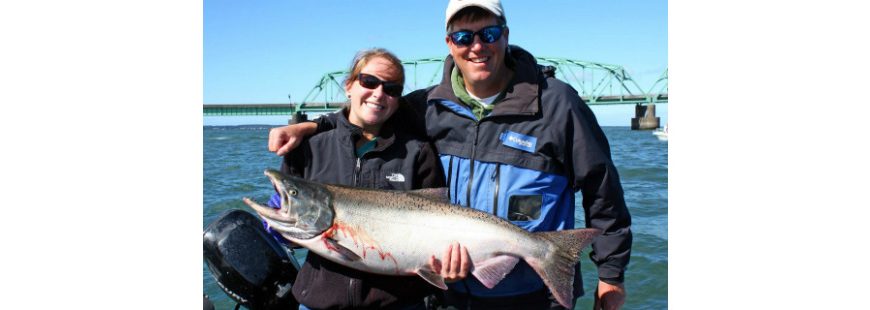Photo: Melissa Peterson & Bob Rees with a Chinook salmon
Soon after I started guiding professionally, I noticed a new level of consciousness come over me, particularly about what was going on around me in the natural world, where I suddenly became a much bigger player in the direct interaction with and impact on the place where I now make my living. It was my job to pay attention to the habits of fish and wildlife and envision what physical moves would produce results for my fishing customers, to help ensure they had a good experience. Or… this “new level of consciousness” may actually just be my own fabrication from the idolization of Luke Skywalker and “The Force,” since I’ve seen Star Wars about 18 times now.
The other thing that dramatically changed when I started guiding was the new level of responsibility I felt for advocating for this resource that was now feeding my family, in more ways than one. It was one of the toughest decisions I made when going into business as a professional harvester. I went from working (for the Oregon Department of Fish and Wildlife) to protect fish, to working to harvest them, and fresh off an ESA listing for coho salmon here in Oregon. To top things off, the sport angler’s access to wild fish was systematically being chopped off as, one by one, populations were plummeting and protections were necessary to avoid more ESA listings. I started my guide business in 1996 and in 10 short years (1992 – 2002) we lost access to wild spring Chinook, cutthroat trout, coho salmon, steelhead and chum salmon; only wild fall Chinook remained open for harvest. Do you know many businesses that stay intact after losing 83% of their “product”?
Although I was schooled in fisheries technology, I clearly had more learning to do. I started digging and understanding the barriers to fish recovery. God knows, there’s been a library of books written on the subject and with the sport angler disenfranchised, fragmented and disorganized, especially against other big industry that had laid claim to competing natural resources, we had some digging out of the grave to do. Now, we may be above ground, thanks in large part to groups like the Association of Northwest Steelheaders and the Northwest Sportfishing Industry Association, but we’re only now becoming recognized as a bigger player in the future of our communities, especially in rural Oregon. I know, only a century too late.
Part of the problem of our suppression over time was that most people thought we just went fishing for fun. Well, yes, we go fishing for fun, but for those of us who have taken it to another level, and there are a bunch of us, we need to go fishing. It’s unexplainable actually. When we ask someone else if they want to go fishing with us and they say they don’t have time, or they’re not really interested, we look sideways at them like an inquisitive dog when you ask it, “Where’s the kitty?” It’s that important to us, it’s that ingrained in us, and it’s simply what we do. I wasn’t the most behaved kid in school or at home and my Mom and Dad tried to come up with innovative ways to punish me for my bad behavior. But none of them worked until my Mom grounded me from the trout opener. Well, then the fish food hit the fan, and all of a sudden, I became an angel, well… maybe I just hid my bad behavior a bit better.
The bottom line here is we, as a consumptive community, have a higher level of responsibility to take care of this resource, so that future generations of “us,” have an opportunity to enjoy what we have come to enjoy. We’ve just recently come off of some incredible years of opportunity and success; we’re getting a bit more of a reality check this year and there are even tougher years ahead. But I’m very proud of this community and only a little disappointed in the masses of people that don’t participate in the protection of this resource. To put things in perspective, here are a few observations – that have not necessarily been fact-checked – but you’ll get the idea of what I’m trying to get at:
- We have over 1,000 guides in the state of Oregon, and it’s likely that less than 25% of them belong to a guide’s association,
- We have about 600,000 licensed anglers in Oregon, and it’s likely that less than 10% of them belong to any conservation organization.
There is so much to pay attention to, so much that we don’t even know how our actions today will affect our future tomorrow. Most fish experts believe we will only have remnant runs of wild fish in the lower Pacific States by 2100. Can anybody legitimately argue that won’t be the future we face? It’s important to be involved, whether you help move the needle on legislation, plant trees, take a kid fishing or simply add your name to a member of an organization, it’s important that you’re involved. Join an organization today and help make a difference for the future of our fisheries.
In Oregon, sport anglers are fighting for a seat at the table, the Oregon Fish and Wildlife Commission table that is, to have a voice in how our fisheries are managed. And on the federal front, sport anglers are fighting for reauthorization of the Magnuson-Stevens Act; the law that governs how our ocean fisheries are managed. We’ll keep you informed on these issues and others, but don’t be the person that sits on the sidelines and complains. Be the person that gets involved, at any level, and makes a difference, or I’ll ground you for the next two trout openers.


